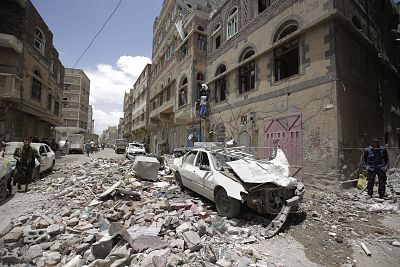Congress approves arms sales to foreign governments. But Trump could bypass lawmakers by declaring a national security emergency to sell weapons to Riyadh.
Democratic Sen. Chris Murphy warned on Wednesday that the Trump administration is considering a move to bypass Congress and push through the sale of bombs to Saudi Arabia by declaring a national security emergency.
The Connecticut lawmaker, an outspoken critic of Saudi Arabia's human rights record and its military campaign in Yemen, expressed concern over the possible action in a series of tweets.
"I am hearing that Trump may use an obscure loophole in the Arms Control Act and notice a major new sale of bombs to Saudi Arabia (the ones they drop in Yemen) in a way that will prevent Congress from objecting." Murphy wrote.
"Arms control law allows Congress to reject a sale to a foreign country. But Trump would claim the sale constitutes an 'emergency' which means Congress can't take a vote of disapproval. It would go through automatically," Murphy tweeted.
The White House National Security Council declined to comment.
Asked about Murphy's comments, State Department spokesperson Morgan Ortagus told reporters: "We do not comment to confirm or deny potential arms sales or transfers until Congress is formally notified."
Three U.S. officials, speaking on condition of anonymity, told NBC News that the administration was poised to unveil an arms sale to Saudi Arabia. But they did not offer more details or confirm that President Donald Trump planned to declare an emergency to bypass Congress.
Saudi Arabia's war in Yemen against Houthi rebels, marked by a heavy civilian death toll from air strikes, and the killing of Saudi journalist Jamal Khashoggi last year at the Saudi consulate in Istanbul, has fueled growing hostility in Congress toward Riyadh.
A bipartisan majority in Congress voted to halt U.S. support for the Saudi-led war in Yemen but President Trump vetoed the legislation last month.
Any move by Trump to expedite an arms deal without congressional approval would trigger an angry reaction among lawmakers from both sides of the aisle and possibly lead to attempts to adopt a broader ban on any weapons sales to the Saudis.
Democratic Sen. Bob Menendez of New Jersey has held up the sale of precision guided bombs to Saudi Arabia since April 2018. The senator has blocked the sale from going forward over allegations from human rights groups that Saudi-led forces have failed to safeguard civilian lives and carried out indiscriminate bombing in Yemen. Riyadh rejects the allegations.
Menendez and other lawmakers also have expressed outrage over the killing of Khashoggi, a Washington Post columnist was last seen entering the Saudi consulate in Istanbul in October 2018. The CIA has concluded that Saudi Crown Prince Mohammed bin Salman ordered the journalist's killing, according to a person briefed on the CIA's assessment.
Murphy raised the possibility that Trump would cite tensions with Iran as an "emergency" to justify invoking his authority.
The Democrat said such a move would set a "dangerous precedent" that could undermine Congress as a check on presidential power.
Under U.S. arms control law, Congress must be given 30 days to approve U.S. arms sales to foreign countries. However, in a rarely used provision of that law, the president can declare an "emergency," sidestepping Congress and sending the sale through immediately. In 1984, President Ronald Reagan used the same provision to sell 400 Stinger missiles and 200 launchers to Saudi Arabia in response to their urgent request for help in defending the kingdom against Iran.
The law still requires the U.S. president to submit to Congress a justification for the emergency arms sale citing the national security interests involved.
Saudi Arabia remains the United States' largest foreign military sales customer with over $129 billion in approved purchases.
Last November, after the killing of Khashoggi, Trump justified the controversial U.S.-Saudi Arabia relationship by pointing to the economic benefits of arms sales to Saudi Arabia.
As of May, around $27.9 billion or 25% of a 10-year $110 billion arms agreement — negotiated under the Trump administration and signed in 2017 — had been implemented.












